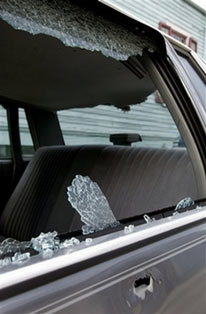
A bullet
hole and shattered window are seen on a car on the street at the scene
where five young men were killed on Saturday June 17, 2006. Five men, one
aged 16, were shot and killed inside a sports utility vehicle at early
Saturday. [AP Photo] |
Five people ranging in age
from 16 to 19 were killed in a street shooting in New Orleans early
Saturday, the most violent crime reported in this slowly repopulating city since
Hurricane Katrina hit last August.
All were believed to have been gunned down in a volley of bullets on a street
in the Central City neighborhood just outside the central business district.
Three of the victims were found in a sport utility vehicle rammed against a
utility pole and two were found nearby on the street.
Authorities said they were looking for one or more suspects but did not
elaborate.
Capt. John Bryson said police think the shootings were either drug-related or
some type of retaliation attack. A semiautomatic weapon was used and "multiple,
multiple rounds" were fired, he said.
"I think the motivation we're looking at is pretty obvious," he said.
"Somebody wanted them dead."
Bryson said he could not remember the last time this many people were killed
in once incident - before or after Katrina. "I can't remember five," he
said.
Four of the victims - a 16-year-old, a 17-year-old and two
19-year-olds - died at the scene. Another 19-year-old, believed to be the
brother of the youngest victim, died later at a hospital, police said.
There was no immediate word if any of the victims had been armed. Their
identities were not immediately released.
Terrance Rayly, 23, who was staying in a home nearby, said he heard the shots
after getting in from a music club.
"It was like 15 gun shots," he said. "I heard pop, pop, pop, pop, pop."
The shooting left many people feeling unsafe in the poor Central City
neighborhood where people sat on porches and discussed the incident Saturday.
"Lord, this is like the sixth person killed around here in the last month,"
said Monique Jackson, a 27-year-old housekeeper who lives around the corner from
the crime scene. "It's getting bad now."
She added: "I don't want to ever hear about a murder ever again. It's just
young people doing it to each other."
Crime, including murder, has been creeping back after Katrina emptied the
city of its residents when it hit on Aug. 29, flooding 80 percent of New
Orleans. Current population estimates vary but the city is believed to have less
than half its pre-storm population of about 455,000.
So far, 52 people have been murdered in the city since Jan. 1, half the
number of murders at this time last year, Bryson said.
There were only 17 killings in January through March. But the rate picked up
after that — there were 13 in April alone, followed by 22 in May and June,
including Saturday's killings.
Bryson said the recent spike in murders, which he said was connected to
drugs, was not just a "police problem" or a "New Orleans problem."
"It's a Louisiana problem, it's a United States problem," he said. "We're
begging the citizens to join with us to coordinate with watch groups."